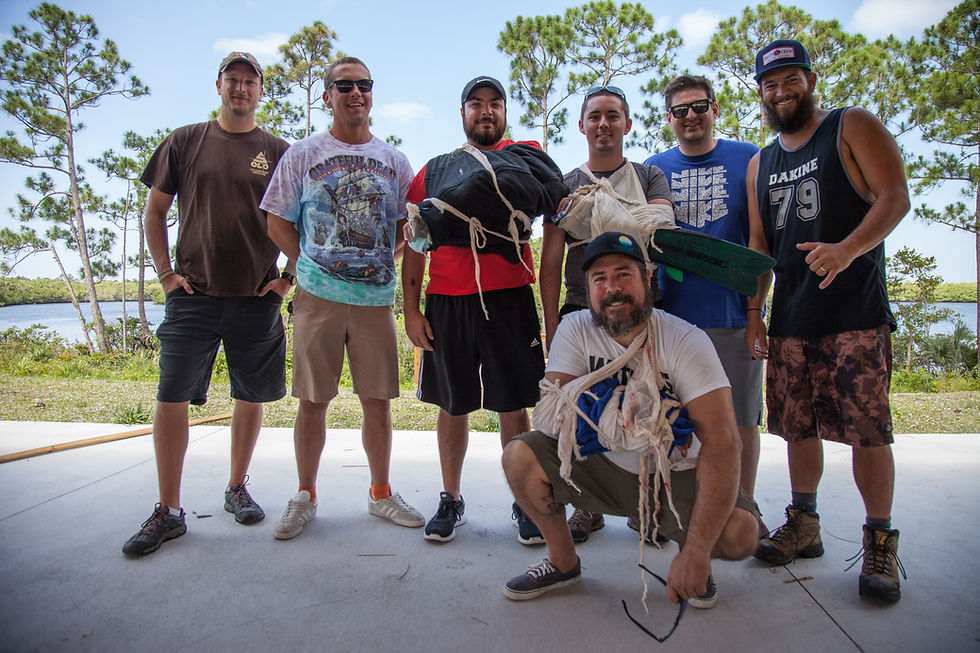Voyage on the Peace River
- Dec 28, 2018
- 3 min read
Updated: Oct 16, 2022

Florida in the fall is a blessing. The blazing heat of summer recedes and we welcome drier air and slightly cooler temperatures with a return to the forest and fresh water rivers of the interior. We journeyed inland to Polk County to paddle the Peace River, a place favored by adventurers interested in fossilized shark teeth and prehistoric mammal bones.
The men paired off into canoes and we paddled along the river for several hours, pausing occasionally to observe wildlife before stopping for lunch on a sandy bank.
Florida is home to an incredible diversity of wildlife but there are many creatures here that don’t belong, referred to as non-native or ‘invasive’ species. Animals sometimes accidentally migrate from their native ecosystem to a foreign one, such as when they’re kept as pets and then released, or when they stowaway in international shipments.
An example of an invasive species found in Florida is the armored catfish. There are several species of catfish that are native to Florida, but the armored catfish should only be found in the Amazon river basin. Here in Florida it is dangerous and destructive; it decimates native wildlife and flora, causing damage to the riverbeds that has a widespread impact on the other animals that make their home in or near the Peace River.
Invasive species throw off the natural balance of an ecosystem, but if you remove them, the native population can flourish once again.
The armor-like plates on the catfish’s body protect it from would-be predators, making it tricky to keep in check. Native catfish will bite a baited hook or even fall for the “noodling” technique, but the armored can only be netted or speared.
Thanks to the many hours spent in the water with John, our guys are gifted and tenacious spear fishermen. Our men took turns wading into the chilly fresh waters of the river with a gigging spear. Though the armored catfish might wreak havoc to our local ecosystem, they were a welcome treat when roasted over an open fire on the sandy, sun-dappled banks of the Peace River.

On the journey of recovery that young men begin when they come to Voyage Recovery, they don’t venture out into the wild alone: they go there with the support and guidance of our clinical team, standing shoulder to shoulder with their brothers.
In active addiction men develop harmful attitudes and behaviors like dishonesty, risk-taking, and manipulation. Addiction can destroy a man’s relationships with his family and friends, and totally derail his momentum at school or work. Addiction can cause a man to risk his freedom, his health, and even his life just so he can use. These behaviors are perfectly suited to a life of addiction, but absolutely unsuitable to a life of recovery.
The attitudes and behaviors associated with addiction are similar to an invasive species: perfectly suited to one ecosystem but dangerous and destructive in another.
Going beyond the decision to abstain from drinking or using drugs, recovery is about identifying the attitudes and behaviors that made it easy or normal to use and purging them.
Just like the beautiful and sensitive wilderness along the Peace River, a man can’t just go in and detonate his life. Men must make their approach with the right tools for the job, carefully removing the invasive attitudes and behaviors, while preserving the elements that make him who he is.
At Voyage Recovery, no man ventures out into the wilderness of addiction recovery alone. Each man is guided by his primary therapist and our whole clinical team who share their experience, insight and expertise in helping him and his family navigate this journey.
Together we root out harmful and destructive thoughts and perspectives in individual therapy, group therapy, and experiential therapy. Our staff are the front line, but each of the men works hard on himself and lends support to his brothers to lay a foundation of recovery.
Just as the men found that it was the most fun sharing delicious roasted catfish that they caught together, the work they do on themselves is best when they’re together too. When they leave us and return to the community, they’ll rely on their church groups and local Twelve Step fellowships for the same kind of compassion and strength.
By hurting and healing together our men are learning how to trust a fellowship.
There are more armored catfish in the river than the ones we caught. The lifelong journey of recovery requires vigilance, awareness, a commitment to maintaining a healthy and meaningful balance. The issues our men identify and process while they’re with us are just the beginning. They’re gaining the tools and insight they’ll need for the rest of their lives to continue along their path to healing.
Call us to learn more about how we help young adult men and their families overcome addiction (772) 245-8345.











